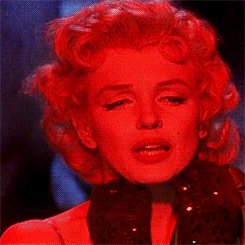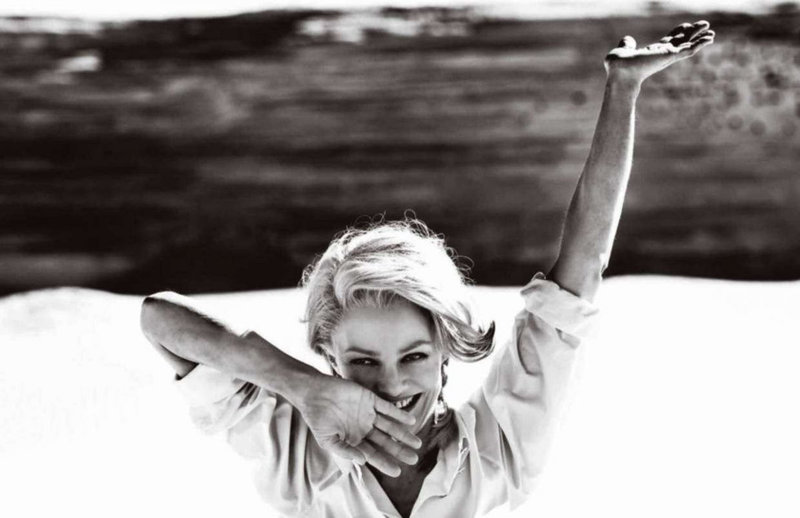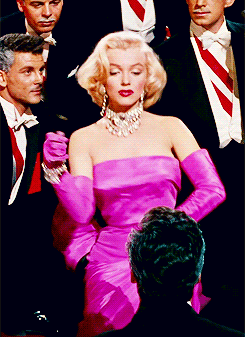Vanessa Paradis dans Madame Figaro - 06 et 07/05/2022
 Madame Figaro
Madame Figaro
n°1967
en supplément du Figaro Week-end du 06 et 07 mai 2022
pays: France
disponible les 06 et 07 mai 2022
Madame Figaro est un magazine supplément hebdomadaire du quotidien Le Figaro - l'édition du week-end paraît chaque vendredi.
En couverture: Vanessa Paradis se met dans la peau de Marilyn Monroe en rejouant "Les Désaxés".
> sur le blog le magazine Madame Figaro - 06 et 07/05/2022
Vanessa Paradis : «Moi, sans enfants j'aurais été quelqu'un d'autre»
> en ligne sur madame.lefigaro.fr
La chanteuse et actrice admire Marilyn Monroe depuis toujours. Soixante ans après sa disparition, Vanessa Paradis se glisse dans la peau de son idole dans une évocation du film culte Les Désaxés, sous l'objectif d'Anton Corbijn. Avant de reprendre la tournée de sa pièce Maman, l'égérie Chanel partage avec nous sa fascination pour la star américaine.
À quoi rêvent les jeunes filles ? Sur les murs de sa chambre, à Villiers-sur-Marne, près de Paris, Vanessa Paradis épinglait des photos de Romy Schneider et de Marilyn Monroe. Pas vraiment les déesses de son époque, mais l'adolescente n'était pas comme les autres, connaissait par cœur César et Rosalie et Les hommes préfèrent les blondes, et devint une star instantanée à 14 ans en nous embarquant dans le taxi de Joe. Les rêveries autour de la blonde platine la plus célèbre du XXe siècle n'ont jamais déserté l'esprit de celle devenue une pop star adulée et une actrice vigoureuse, aussi à l'aise dans le drame que la comédie. Il nous a paru évident de lui proposer de se glisser dans la peau de son idole (au sujet de laquelle elle est incollable) à l'occasion des soixante ans de la disparition de celle qu'un seul prénom suffit à identifier, Marilyn, morte à Los Angeles le 4 août 1962, dans des circonstances jamais élucidées, surdosage de médicaments, suicide, assassinat (notre invitée penche pour la dernière hypothèse).
Vanessa Paradis a choisi Les Désaxés (The Misfits, de John Huston, 1961), film désenchanté et crépusculaire où Monroe joue avec une vérité bouleversante, crachant son mal-être dans une scène célèbre, frêle figure pâlissante perdue dans les étendues brûlées du Nevada. C'est sur le sable blanc de la forêt de Fontainebleau qu'Anton Corbijn a recréé le set de ce film maudit en noir et blanc avec une Vanessa Paradis platinée plus vraie que nature. Le photographe star et réalisateur avait croisé son chemin lorsqu'elle avait 20 ans, puis à nouveau l'an dernier quand il l'a photographiée lors de la présentation de la haute couture printemps-été de la maison Chanel, dont Vanessa Paradis est l'emblématique ambassadrice. Ils avaient très envie de se retrouver pour une occasion exceptionnelle. Moteur !
Madame Figaro . – Comment est née cette passion pour Marilyn Monroe ?
Vanessa Paradis. – Je devais avoir 5 ou 6 ans quand je suis tombée par hasard sur un livre dans la bibliothèque de mes parents, c'était une biographie, le genre de livre avec quelques photos dans les pages centrales. J'ai été comme foudroyée par la beauté hallucinante de cette femme dont j'ignorais tout. Les photos m'ont amenée aux films, puis les films aux disques. Marilyn Monroe n'est plus jamais sortie de ma tête. J'ai regardé ses films en boucle, puis, plus tard, j'ai lu chaque biographie, vu chaque documentaire. Une adoration ne s'explique pas. Il y a la beauté, la féminité, la grâce, la délicatesse et, en même temps, quelque chose de tragique qu'on ressent, qu'on pressent. Tout m'attire, tout me plaît, ses regards, ses sourires, la façon dont elle bouge. Et cette modernité incroyable pour l'époque. Il y a chez elle une chose qu'on n'avait jamais vue ailleurs : ce rapport au corps, cette liberté du corps sans jamais être vulgaire, un corps totalement affirmé, mais qui n'a pas renoncé à l'enfance non plus.
Vous souvenez-vous du premier film que vous ayez vu avec elle ?
Probablement Les hommes préfèrent les blondes, j'ai toujours aimé les comédies musicales, et le film de Howard Hawks est un rêve pour les petites filles, avec son Technicolor, ses costumes et ses chansons. J'ai aussi beaucoup vu La Rivière sans retour et Certains l'aiment chaud évidemment. Plus tard, j'ai découvert Les Désaxés et des films moins connus, comme Troublez-moi ce soir dans lequel elle est déjà une actrice extraordinaire, juste, puissante et totalement inquiétante dans le rôle d'une baby-sitter déséquilibrée. Et puis il y a la chanteuse évidemment, elle vénérait Ella Fitzgerald et ça s'entend : c'est une chanteuse de jazz divine, avec une voix de velours et un vibrato merveilleux. Quand j'écoute son Lazy, d'Irving Berlin, je suis envoûtée.
Qu'évoque pour vous la part sombre de Marilyn Monroe ?
Je pense à Fragments, un recueil d'écrits intimes publié bien après sa mort, un livre terriblement intrusif, mais qui nous éclaire sur son esprit et sa pensée. On découvre sa profondeur, sa sensibilité et sa détresse aussi, ses craintes, ses doutes, la peur de la folie. C'était une âme tourmentée qui n'a eu de cesse de progresser et de s'accomplir.
On dit que vous possédez beaucoup de choses ayant appartenu à Monroe.
Je ne suis pas collectionneuse, mais je possède quelques trucs qu'on m'a offerts. Une paire de chaussures par exemple, des escarpins blancs sublimes. Nous avons la même pointure, je les passe parfois, je fais quelques pas et je les range, car j'ai trop peur de les déformer. J'ai aussi une veste, une cape, un chapeau que je porte parfois, mais très peu souvent car ils sont inestimables à mes yeux. Une fois je suis allée rôder autour de la villa qu'elle a possédée à Brentwood et où elle est morte. J'ai mis longtemps avant de me décider à m'y rendre, et j'étais très émue de découvrir depuis l'extérieur cette hacienda modeste, sa seule maison, où elle n'a pas vécu longtemps, la pauvre chérie, quelques mois seulement.
Vous avez vécu à Hollywood, la patrie du cinéma. C'est quelque chose qui vous rapproche d'elle ?
À l'époque où j'y vivais, je menais une existence très familiale : les enfants, l'école. Il n'y avait rien de hollywoodien dans mon train de vie, j'allais très peu aux dîners, et je n'ai assisté à la cérémonie des Oscars que deux fois. C'était merveilleux de voir autant d'acteurs si connus, c'était mon rêve de cinéma américain mais pas du tout mon rêve américain, car je n'ai jamais ambitionné d'en faire partie. Peut-être parce que ça demande trop de soi, ça veut dire n'être disponible que pour ça et, probablement, tourner des films qu'on n'a pas envie de faire pour pouvoir accéder à ceux qu'on cible. Il n'y avait aucune raison pour moi de me lancer dans ce parcours du combattant. Plus jeune pourtant, après le tournage de Noces blanches, mon premier film, j'ai fait quelques castings improbables comme celui de Proposition indécente, pour le rôle de Demi Moore ! Ça n'avait absolument aucun sens, et rétrospectivement je trouve ça très bizarre. J'ai rapidement mis le holà à ce genre d'expériences, et je n'en éprouve aucun regret : je suis comblée en France.
Monroe était manipulée et, selon certains, manipulatrice. Y a-t-il une façon de bien gérer les excès de la célébrité ?
Manipulatrice, je n'aime pas ce mot ; ce qui est sûr, c'est qu'elle était une bonne communicante, mais j'ignore si cela relevait d'une stratégie. Elle était intelligente et elle savait se servir de son image. L'image, c'est une arme. Chez Marilyn, c'est aussi un appel à être regardée et aimée. Et puis, il y a un contexte, les années 1950, et un pays, l'Amérique. Les acteurs appartenaient à des studios, ils étaient coincés, l'émancipation a commencé la décennie suivante. Marilyn, elle, a démarré sa carrière à la fin des années 1940, et probablement que son corps et sa séduction lui permettaient de déstabiliser ses interlocuteurs et, d'une certaine façon, de se faire entendre et d'exister. Elle a quand même réussi à imposer quelque chose de très exceptionnel à l'époque : une liberté d'être soi, au sens large, l'affirmation d'un corps sensuel.
À vos débuts, vous-même avez été cataloguée femme-enfant…
Le contexte est vraiment différent, ce n'est pas la même époque, pas la même culture, pas les mêmes difficultés. Mais la problématique de Monroe reste une problématique d'aujourd'hui : la place des femmes dans la société et dans le travail. En ce qui me concerne, c'est vrai, à mes débuts j'ai d'abord été considérée comme une femme-enfant et une chanteuse sans vraiment de talent. On se demandait un peu ce que je faisais là. Le succès était si foudroyant qu'il était sans rapport avec ce que je pouvais proposer. Il a fallu du temps pour que je prouve qu'il y avait quelque chose de valable en moi. Marilyn Monroe, elle, n'a pas connu de son vivant la reconnaissance qu'elle méritait. C'est arrivé après. Pourtant, elle a tout fait pour progresser, elle est partie vivre à New York, elle s'est rapprochée de Lee Strasberg, elle a monté sa boîte de production, des choses absolument pas conventionnelles pour l'époque, mais on continuait à ne pas la prendre au sérieux.
Avez-vous eu à souffrir des distorsions de l'image ?
L'image, on vous la prend certes, mais on la donne aussi, on en joue. C'est un échange. Je suis de la génération du clip et des pochettes de disques, tout passait par là, c'était une façon de se présenter au monde. Au début, cela a pu être douloureux, on ne peut pas empêcher les gens de parler, de juger, d'être injustes parfois, oui, j'ai été blessée par moments, mais au bout du compte ce qui reste c'est votre travail, le cœur et l'essence de votre travail. Pour réussir à tenir, il a fallu que je m'accroche à des choses concrètes : la musique, les concerts, les films. Le reste fait partie du jeu : être aimée, ne pas être aimée. Quant à la reconnaissance, elle est primordiale, mais pas seulement dans les métiers artistiques. Tout travail mérite de l'attention et si possible de l'appréciation.
Vous aimez Marilyn Monroe et Romy Schneider, deux actrices qui, dit-on, ont été brûlées par le cinéma…
Par la vie, plutôt, même si le cinéma n'a pas dû arranger les choses. Ce sont deux femmes qui ont vécu des vies, des enfances et des amours compliquées. Et, dans le cas de Marilyn, circonstance aggravante, c'était l'époque où les acteurs étaient totalement dépendants des médicaments sans qu'on en mesure les effets désastreux sur la santé. Ce que je sais, c'est que j'ai eu des parents incroyables, qui m'ont donné de l'amour et de la confiance, qui m'ont aimée, entourée, accompagnée. Je ne dis pas qu'on ne peut pas s'en sortir sans ce préalable – on peut se choisir des familles autres que la sienne —, mais c'est beaucoup plus facile de partir dans la vie en se sentant soutenue. Être actrice, c'est terriblement déstabilisant, on vous scrute sur un écran géant, vous dépendez du désir des autres et quand on ne veut plus de vous, c'est fini…
Autre chose qui vous touche chez Marilyn ?
Dans les drames de sa vie, elle a perdu tous les enfants qu'elle a portés. Mère, elle aurait probablement vécu une autre vie. Moi, sans enfants, j'aurais été quelqu'un d 'autre. Je ne pense pas que les femmes doivent faire des enfants pour s'accomplir, mais moi j'ai toujours voulu en avoir, et ils ont façonné la femme que je suis aujourd'hui.
Comment imaginez-vous Marilyn Monroe si elle avait vécu ?
Je n'arrive pas à l'imaginer en femme mûre, encore moins en vieille dame. Elle aurait 96 ans. En 1962, au moment de sa mort, elle avait des projets, une maison de production. C'était une femme dirigée par son cœur : peut-être aurait-elle rencontré un homme qui l'aurait aimé pour ce qu'elle était ?
Vanessa Paradis est en tournée dès septembre avec la pièce Maman, de Samuel Benchetrit.
Séance photos
Photographe: Anton Corbinj
Photos des coulisses de John Nollet
Styliste:
Traduction de l'article et de l'interview - in english:
Vanessa Paradis: "Me, without children, I would have been someone else"
The singer and actress has always admired Marilyn Monroe. Sixty years after her death, Vanessa Paradis slips into the skin of her idol in an evocation of the cult film The Misfits, under the lens of Anton Corbijn. Before resuming the tour of her piece Maman, the Chanel muse shares with us her fascination for the American star.
Vanessa Paradis. – I must have been 5 or 6 years old when I stumbled across a book in my parents' library, it was a biography, the kind of book with a few pictures in the middle pages. I was as if struck down by the hallucinating beauty of this woman of whom I knew nothing. Photos led me to films, then films to records. Marilyn Monroe never got out of my head again. I watched his films over and over, then later I read every biography, saw every documentary. An adoration cannot be explained. There is beauty, femininity, grace, delicacy and, at the same time, something tragic that we feel, that we sense. Everything attracts me, everything pleases me, her looks, her smiles, the way she moves. And this incredible modernity for the time. There is something about her that we had never seen elsewhere: this relationship to the body, this freedom of the body without ever being vulgar, a totally assertive body, but which has not given up on childhood either.
Probably Gentlemen Prefer Blondes, I've always loved musicals, and Howard Hawks' movie is a little girl's dream, with its Technicolor, costumes and songs. I have also seen The River of No Return a lot and obviously Some like it hot. Later, I discovered The Misfits and lesser-known films, like Don't bother to knock, in which she is already an extraordinary, just, powerful and totally disturbing actress in the role of an unbalanced babysitter. And then there's the singer of course, she revered Ella Fitzgerald and you can hear it: she's a divine jazz singer, with a velvet voice and a marvelous vibrato. When I listen to her Lazy, by Irving Berlin, I am bewitched.
I'm thinking of Fragments, a collection of private writings published long after his death, a terribly intrusive book, but one that sheds light on his mind and his thinking. We discover his depth, his sensitivity and his distress too, his fears, his doubts, the fear of madness. He was a tormented soul who never stopped progressing and fulfilling himself.
I'm not a collector, but I have a few things that were given to me. A pair of shoes for example, sublime white pumps. We have the same shoe size, I sometimes put them on, take a few steps and put them away, because I'm too afraid of deforming them. I also have a jacket, a cape, a hat that I wear sometimes, but very infrequently because they are invaluable to me. Once I went prowling around the villa she owned in Brentwood and where she died. It took me a long time to decide to go there, and I was very moved to discover from the outside this modest hacienda, her only house, where she did not live long, the poor darling, a few months only.
When I lived there, I led a very family life: the children, the school. There was nothing Hollywood in my lifestyle, I went to dinner very little, and I only attended the Oscars twice. It was wonderful to see so many famous actors, it was my dream of American cinema but not at all my American dream, because I never aspired to be part of it. Perhaps because it requires too much of oneself, it means being available only for that and, probably, shooting films that you don't want to make in order to be able to reach those you are targeting. There was no reason for me to embark on this obstacle course. When I was younger, however, after shooting Noce Blanche (Baby Blue), my first film, I did some improbable castings like Indecent Proposal, for the role of Demi Moore! It made absolutely no sense, and in retrospect I find it very odd. I quickly put the kibosh on this kind of experience, and I have no regrets about it: I am fulfilled in France.
Manipulative, I don't like that word; what is certain is that she was a good communicator, but I don't know if that was part of a strategy. She was smart and she knew how to use her image. The image is a weapon. Chez Marilyn is also a call to be watched and loved. And then there is a context, the 1950s, and a country, America. Actors belonged to studios, they were stuck, emancipation began the following decade. Marilyn, she started her career at the end of the 1940s, and probably her body and her seduction allowed her to destabilize her interlocutors and, in a certain way, to be heard and to exist. She still managed to impose something very exceptional at the time: a freedom to be oneself, in the broad sense, the affirmation of a sensual body.
The context is really different, it's not the same era, not the same culture, not the same difficulties. But Monroe's problem remains a problem today: the place of women in society and in the workplace. As far as I'm concerned, it's true, when I started out I was first considered a woman-child and a singer without really any talent. We were wondering what I was doing there. The success was so overwhelming that it had nothing to do with what I could offer. It took time for me to prove that there was something worthwhile in me. Marilyn Monroe, she did not know during her lifetime the recognition she deserved. It happened after. However, she did everything to progress, she went to live in New York, she got closer to Lee Strasberg, she set up her production company, things that were absolutely unconventional for the time, but we continued not to take it seriously.
The image, we certainly take it from you, but we also give it, we play with it. It's an exchange. I'm from the generation of music videos and record covers, everything went through that, it was a way of presenting yourself to the world. At first it might have been painful, you can't stop people from talking, judging, being unfair sometimes, yes I was hurt at times, but in the end what remains is your work, the heart and essence of your work. To succeed, I had to cling to concrete things: music, concerts, films. The rest is part of the game: to be loved, not to be loved. As for recognition, it is essential, but not only in the artistic professions. All work deserves attention and, if possible, appreciation.
By life, rather, even if the cinema did not have to arrange things. They are two women who have lived complicated lives, childhoods and loves. And, in the case of Marilyn, an aggravating circumstance, it was the time when the actors were totally dependent on drugs without the disastrous effects on health being measured. What I do know is that I had incredible parents, who gave me love and confidence, who loved me, surrounded me, accompanied me. I'm not saying that you can't get by without this prerequisite – you can choose families other than your own – but it's much easier to start out in life feeling supported. Being an actress is terribly destabilizing, you are scrutinized on a giant screen, you depend on the desires of others and when you are no longer wanted, it's over...
In the dramas of her life, she lost all the children she bore. Mother, she probably would have lived another life. Me, without children, I would have been someone else. I don't think women have to have children to be fulfilled, but I always wanted to have them, and they shaped the woman I am today.
I can't imagine her as a mature woman, let alone an old lady. She would be 96 years old. In 1962, at the time of her death, she had projects, a production house. She was a woman ruled by her heart: perhaps she would have met a man who would have loved her for what she was?
© All images are copyright and protected by their respective owners, assignees or others.
copyright text Madame Figaro

/image%2F1211268%2F20240315%2Fob_782fd3_banner-mm-2024-03-spring-5.jpg)
/image%2F1211268%2F20240410%2Fob_40c4f9_blog-gif-mm-niagara-1-3.gif)

/image%2F1211268%2F20240417%2Fob_0b0d56_2024-03-lee-mexique.jpg)
/https%3A%2F%2Fstorage.canalblog.com%2F19%2F65%2F312561%2F91436129_o.jpg)
/https%3A%2F%2Fstorage.canalblog.com%2F57%2F63%2F312561%2F127743382_o.jpg)
/https%3A%2F%2Fstorage.canalblog.com%2F98%2F05%2F312561%2F84823731_o.jpg)
/https%3A%2F%2Fstorage.canalblog.com%2F01%2F63%2F312561%2F84814201_o.jpg)
/https%3A%2F%2Fstorage.canalblog.com%2F66%2F21%2F312561%2F82823948_o.jpg)
/https%3A%2F%2Fstorage.canalblog.com%2F32%2F31%2F312561%2F124125043_o.jpg)
/https%3A%2F%2Fstorage.canalblog.com%2F31%2F08%2F312561%2F71448014_o.jpg)
/https%3A%2F%2Fstorage.canalblog.com%2F34%2F90%2F312561%2F81829009_o.jpg)
/https%3A%2F%2Fstorage.canalblog.com%2F18%2F35%2F312561%2F61120383_o.jpg)
/image%2F1211268%2F20240410%2Fob_9f471d_blog-gif-mm-syi-1.gif)




















/http%3A%2F%2Fstorage.canalblog.com%2F52%2F10%2F312561%2F133747751_o.jpg)
/http%3A%2F%2Fstorage.canalblog.com%2F99%2F91%2F312561%2F133115405_o.jpg)

/image%2F1211268%2F20240229%2Fob_66f2c6_tag-mm-public-martin-lewis-show-1.png)
/image%2F1211268%2F20240410%2Fob_07cb4a_blog-gif-mm-stern-1.gif)
/image%2F1211268%2F20240229%2Fob_143453_blog-gif-video.gif)
/image%2F1211268%2F20240301%2Fob_735dec_blog-liens-culture.jpg)

/image%2F1211268%2F20240302%2Fob_e11252_blog-liens-friends-jane.gif)